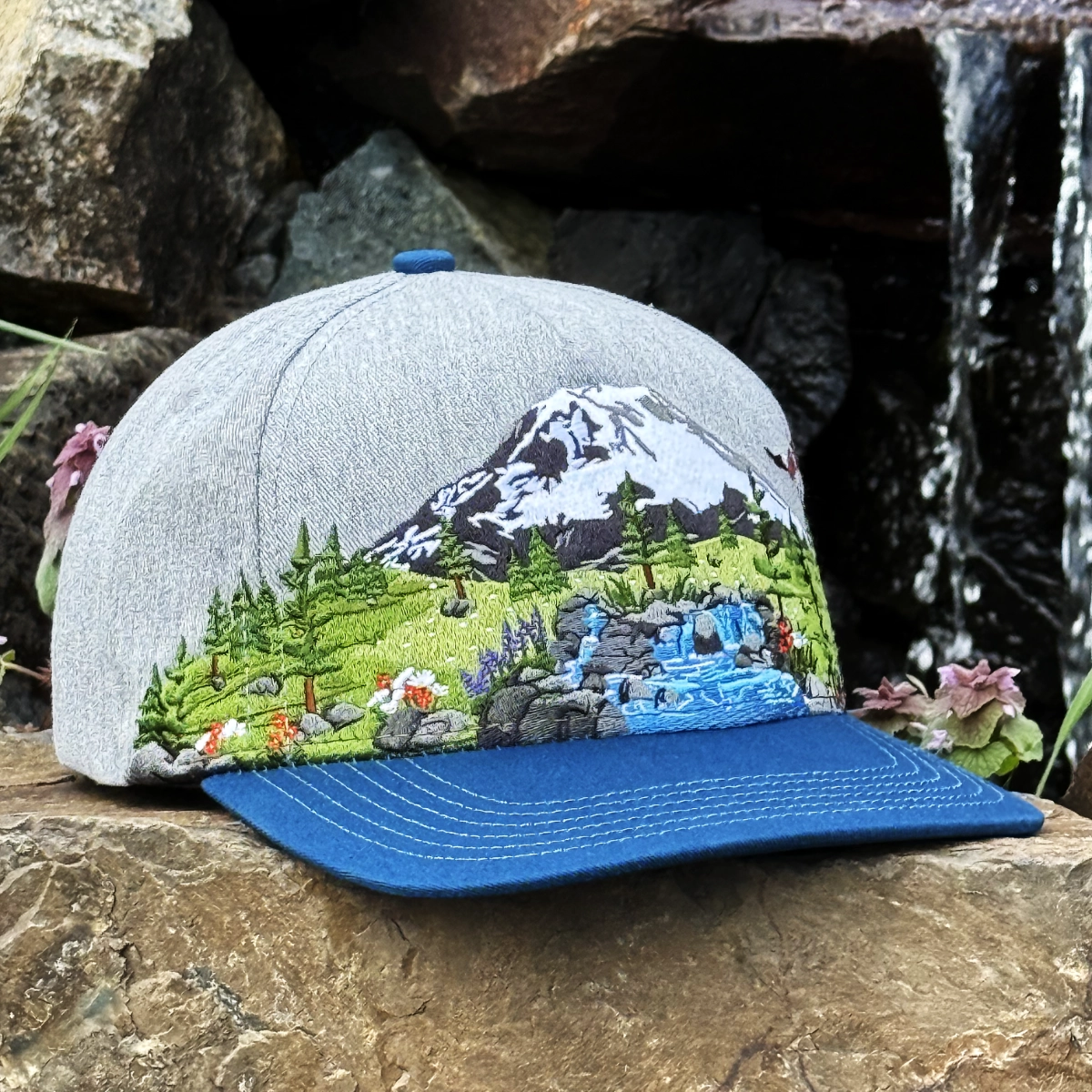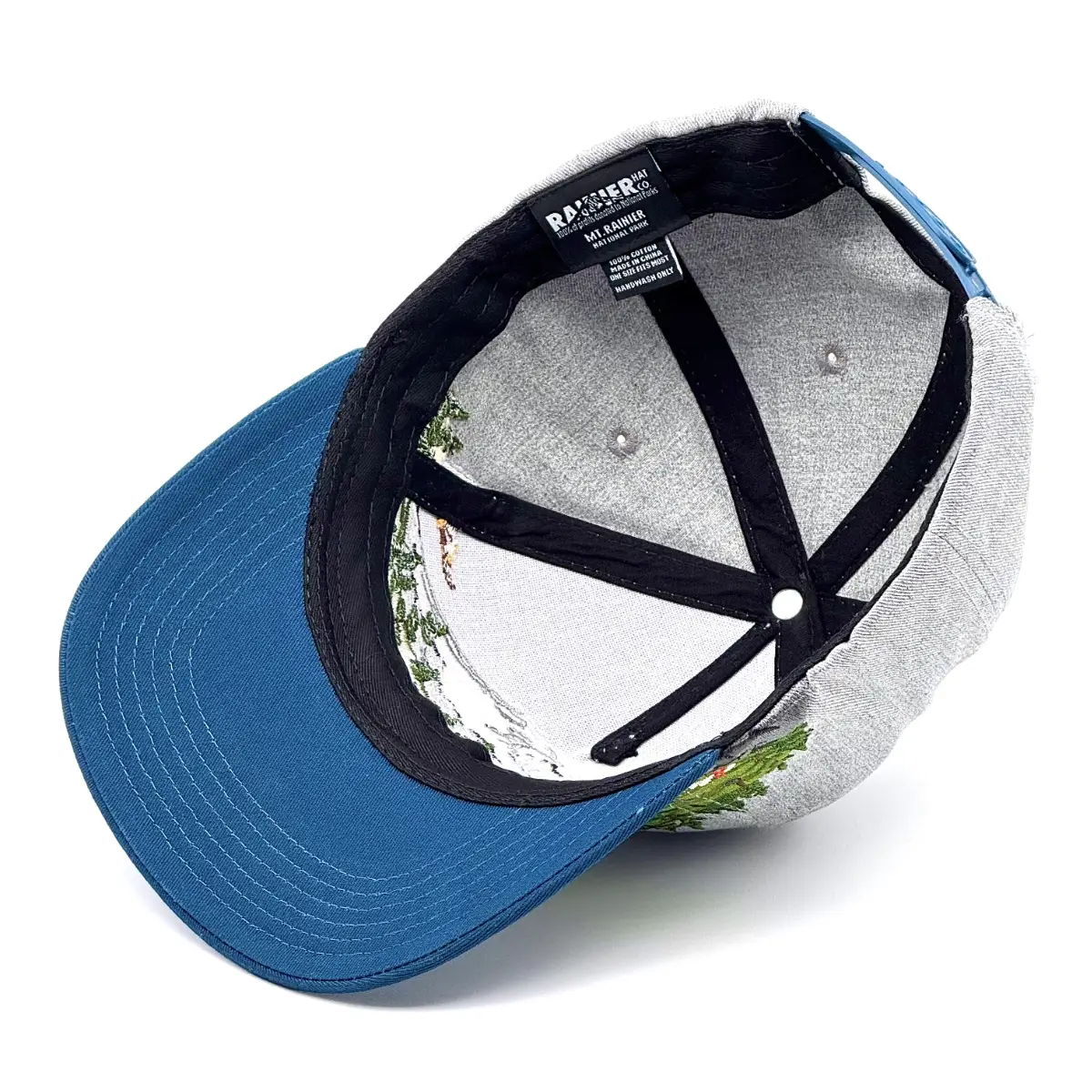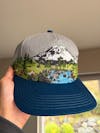Mt. RainierNational Park Hat









Details
- Embroidered panoramic design
- Adjustable snapback hat
- Structured mid-profile 5 panel
- Cotton
- Handwash
- Free shipping, free returns
- 100% of profits donated to National Parks
Customer Reviews
The panoramic embroidery of the hat was done exceptionally well. The colors used, matched with the landscape concept provides for a hat that grabs your attention as if it’s 3D, yet not obnoxiously 3D screaming in your face.
This hat is a masterpiece. The embroidered scene is breathtaking, with a snow-capped mountain looming proud, a waterfall that practically shimmers in the stitching, and an eagle soaring like it owns the sky. Every detail sings, from delicate wildflowers to rugged evergreens and a rocky stream, bottling up the PNW's soul. Tough enough for daily wear yet soft against the head, ready for anything from sudden drizzles to lazy afternoons. This isn’t just a hat, it’s a love letter to the wild and a piece of home. There's really nothing quite like it!
As someone who loves exploring national parks, I'm always on the lookout for unique merchandise that captures the essence of the location, and this hat did just that. I instantly recognized the iconic Mount Rainier when I saw pictures of the hat online. After I received the hat in the mail, I became more impressed by the details in the embroidery. It's rare to find hats with this level of detail. This hat is perfect for outdoor enthusiasts, everyday wear and from working on the yard to hiking. I'm looking forward to wearing the hat on hikes as the weather gets nicer.
First off… it’s dope! But really, I didn’t just find a hat—I found a story. This cap is a vivid, wearable postcard from the Pacific Northwest: lush wildflowers bloom along the brim, a serene blue camper van cruises through a mountain pass, and the iconic peak of Mt. Rainier towers in the distance like a sentinel of exploration. It’s not just stylish—it’s an ode to road trips, fresh air, and freedom. The color combo is bold yet balanced: the cool grey crown contrasts beautifully with the vivid, scene-stealing artwork and the blue brim that ties it all together. It’s comfy, lightweight, and turns heads in the best way. Every time I put it on, people ask, “Where’d you get that hat?” If you’re looking to top off your outfit with something that makes a statement, sparks conversation, and reminds you of why you love the outdoors—this is the hat.

This Mt. Rainier hat is exactly what I wanted something that doesn't scream "branded" but still looks great. The adjustable fit is super comfortable and wow the embroidery detail is incredible... best I've seen on any hat. It's actually so nice I've been nervous to wear it hiking yet lol! But thats why I got it. The national park design is stunning and different from typical outdoor gear. It's also a cool conversation starter. I've already recommended it to a few friends who ended up buying one as well. Perfect for hikes or just hanging out. Quality is top notch! Totally worth the $$ compared to other hats I've bought before.

Mt. Rainier National Park Hat Inspiration
The newest Mt. Rainier National Park hat is inspired by one of the most iconic and breathtaking views in the park - the view from the top of Myrtle Falls looking out toward the snowcapped summit of Mt. Rainier.
From this vantage point the mountain rises dramatically above alpine meadows while the snow runoff of Myrtle Falls cascades down into the valley below.
All around Myrtle Falls springtime brings new life with vibrant wildflowers including purple and blue lupines - favorites of the subalpine meadows that bloom along the Skyline Trail each summer. These native flowers thrive in the short but explosive growing season bringing bursts of color to the green slopes below the peak.
Soaring above is a Bald Eagle, a native of the Pacific Northwest that can been seen all over the region on perching on the tops of trees and hunting fish in lakes and waterways.
Design Process
Creating these National Park hats with their panoramic embroidery is a detailed process going beyond simply buying and reselling bulk designs. There are no logos and no branding on any of our hats, just National Parks, from a small company in Seattle, Washington.
The first step is having gone to every park we feature, and we have! We try to find that specific viewpoint in the park to show off and what we need to do to capture the feeling of being there. Sometimes we ad-lib a bit of the design to include other elements to capture the feeling of the park as a whole, but we try hard to highlight an actual place in the park you can visit.
Then we get to designing! Embroidery is naturally limited in colors and we use a 15 color (the most you'll find) edgeless embroidery process which takes upwards of 90 minutes and over 60,000 stitches per hat, but allows us to show off every detail from that epic mountain range to the colorful flowers in your favorite park.
Finally the design get digitized for embroidery, a sample is made for any final tweaks, and we go to production getting these fantastic hats on your heads.
And 100% of our profits are donated right back to our National Parks .
Visit the Inspiration
To reach the Mt. Rainier viewpoint, start at the Paradise visitor area. From the main parking lot, find the paved Skyline Trail that begins near the Paradise Inn. Follow this accessible pathway about a half mile from the trailhead. The trail gradually climbs through subalpine meadows toward the Myrtle Falls viewpoint.
The viewpoint is located at a wooden bridge that crosses Edith Creek just above the waterfall. This is where you'll find the classic view of Mt. Rainier framed behind the top of Myrtle Falls. With only 100 feet of elevation it's a great walk for most visitors. Allow 20-30 minutes each way at a leisurely pace.
This trail is typically snow-covered from October through June or July. During winter and spring, use caution as snow and ice can make the path slippery. Always stay on designated trails to protect fragile meadow vegetation. The best time to visit is mid-July through September when wildflowers are in bloom and the path is usually snow-free.
Mt. Rainier National Park
Mt. Rainier National Park is celebrated as an iconic symbol of Washington State's natural beauty, embodying the essence of the Pacific Northwest's majestic landscapes. Dominated by the towering presence of Mt. Rainier itself, the park stands as a testament to the awe-inspiring power of nature.
With its summit reaching an impressive height of over 14,000 feet above sea level, this colossal mountain, cloaked in glaciers and snow, marks the highest peak in the Cascade Range, drawing the gaze and aspirations of adventurers from around the globe.
Renowned as a top destination for mountaineers, hikers, and nature lovers, the park offers an array of trails that wind through ancient forests, subalpine meadows ablaze with wildflowers, and past serene lakes and waterfalls.
The challenging climb to the summit of Mt. Rainier is a coveted achievement for climbers, presenting a test of skill and endurance amidst breathtaking vistas. Meanwhile, the park's diverse ecosystems provide a haven for wildlife, making it a pivotal area for conservation efforts and a fascinating location for those passionate about the natural world.
With its unparalleled beauty and the myriad of recreational opportunities it presents, Mt. Rainier National Park serves as a cherished escape for those seeking adventure, solitude, or simply the chance to immerse themselves in the splendor of nature's creations.
Its status as a jewel in the crown of Washington's natural attractions is undiminished, inviting all to explore and marvel at the wonders it holds.
Most Popular Hikes
Skyline Trail Loop
If you're going to do one hike on Mt. Rainier, this is the one to do. Offering panoramic views of Mt. Rainier and its surrounding landscapes, the loop from Paradise is about 5.5 miles long, with an elevation gain that makes it a moderately challenging hike. It's famous for its wildflower meadows in the summer and stunning vistas of glaciers and the Nisqually Valley.
Wonderland Trail Thru-Hike
Encircling the entire Mt. Rainier, this epic 93-mile trail is a favorite among backpackers seeking a multi-day adventure. The trail offers an immersive experience of the park's diverse ecosystems, from lowland forests to subalpine meadows. Hikers will encounter stunning views, challenging terrain, and the opportunity to truly connect with nature.
Sunrise Rim Trail
Starting from the Sunrise Visitor Center, this trail offers spectacular views of Mt. Rainier, Emmons Glacier, and the White River valley. It's a short hike, providing an accessible option for many visitors. The trail is about 5 miles round trip, making it perfect for a leisurely day hike.
Naches Peak Loop
This 3.5-mile loop trail is perfect for families and offers stunning views of Mt. Rainier, vibrant wildflowers, and Tipsoo Lake. It's an easier option that provides a rewarding experience with minimal effort. The well-maintained path and beautiful scenery make it a popular choice for hikers of all ages.
Burroughs Mountain
This hike takes you closer to Mt. Rainier than most other trails in the park. The hike can extend to Third Burroughs, offering unmatched views of the mountain, glaciers, and the surrounding area. Starting from Sunrise, the hike to Third Burroughs is about 9 miles round trip and is considered strenuous, perfect for experienced hikers seeking a challenge.
Mt. Rainier
Mt. Rainier, also known by its native name Mount Tahoma, holds a rich history deeply rooted in the culture and traditions of the indigenous peoples of the Pacific Northwest. The name Tahoma, meaning "mother of waters" in the Lushootseed language, reflects the mountain's significance as a source of rivers and streams that flow through the surrounding landscapes.
Historically, the mountain has been a prominent landmark and spiritual icon for the local Native American tribes, serving as a guiding beacon and a sacred site. Over time, while the name Mt. Rainier, given by European explorers in honor of Admiral Peter Rainier, has become widely recognized, efforts to honor and acknowledge the mountain's original name and its cultural importance continue.
Standing as the highest peak in the Cascade Range, commands attention with its awe-inspiring elevation of 14,411 feet above sea level. This majestic mountain is not only a prominent landmark but also a crucial centerpiece of the diverse ecosystems within Mt. Rainier National Park.
Enveloped by glaciers, Mt Rainier is home to one of the most extensive glacier systems in the contiguous United States, with the Emmons Glacier being notably the largest glacier by area. These icy giants play a vital role in the park's hydrology, feeding rivers and nurturing the surrounding landscapes throughout the seasons.
Surrounding the icy expanse, subalpine meadows burst into a riot of colors with wildflowers each summer, creating a stark contrast to the snow-capped peak. These meadows serve as crucial habitats for pollinators and a variety of alpine species, offering a breathtaking spectacle for visitors.
The park's old-growth forests, comprising douglas firs, western red cedars, and western hemlocks, add another layer to the park's biological diversity, creating a haven for wildlife and preserving a glimpse into the ancient past of the Pacific Northwest.
The ecosystems within Mt. Rainier National Park are as varied as they are intricate, supporting a wide range of flora and fauna. This diversity underscores the importance of conservation efforts aimed at protecting these habitats from the impacts of climate change, pollution, and human activity.
Initiatives to restore and maintain the park's natural beauty are essential for ensuring that future generations can continue to marvel at the wonders of Mt Rainier, its glaciers, meadows, and ancient forests. Through dedicated conservation efforts, the park remains a testament to the enduring splendor of nature, inviting all to witness and preserve its majestic beauty.
